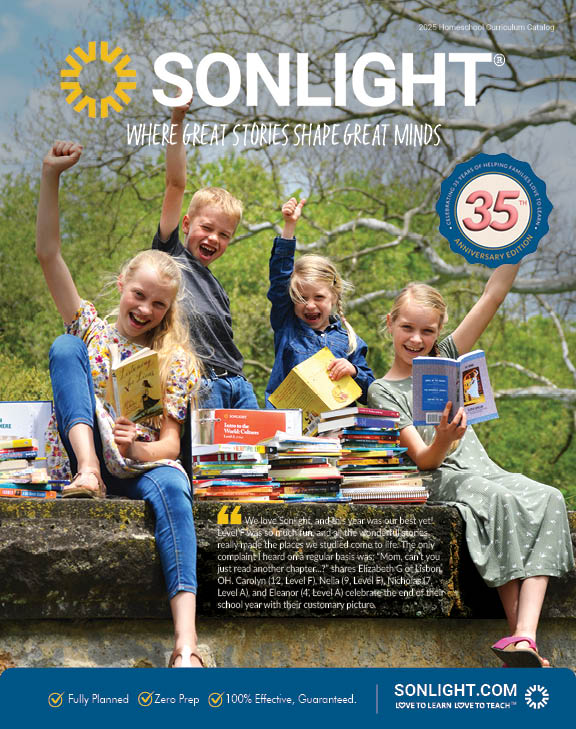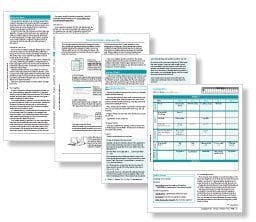Build Family Bonds with Sonlight Curriculum
At Sonlight, we believe that homeschooling is a way of life and an overarching attitude toward the world. The world is out there to be marveled at, enjoyed, explored, and learned from. Once you catch on to this idea, you will find it easy to see educational value in almost everything you do.
Explore the Wonder of the World
Though Sonlight has specific times set aside for concentrated reading of books, writing of papers, and working through math texts, our curriculum encourages parents to look for "teaching moments" throughout the day.
Our world is a place of wonder and exploration. Just take a look around — potential learning experiences can be found at every turn. Use your daily encounters with the unfamiliar to teach your children.
If they (or you) don't understand something, look it up. Use a dictionary or encyclopedia. Go to the library. Use the Internet. Do some research! Search for the answer together. Make it an adventure.
After you find an answer, expand the learning experience by looking for a practical application to reinforce the lesson. Remember: not everything your children need to know can be learned in books. Some things can only be learned by doing.
An Engaging Process
Sonlight requires significant parental involvement. Although some things — basic math facts, for instance — are best learned through rote memorization and raw repetition, most other subjects profit greatly from the presence and involvement of an older, more experienced person. You bring your own knowledge and values to the learning process. You can inject your insights into the discussion.
In fact, one of the prime reasons you should want to homeschool is to stay engaged with your children and their educational process... to pass along to your children your specific intellectual and cultural heritage.
Don't ask the questions in Sonlight's Instructor's Guides unthinkingly. If you're going to use them, ask them in such a way that you can discern the true import of what your child is saying. Ask follow-up questions of your own. Dig out the meaning of what they're reading.
You have the opportunity to serve as mentor to your own children. Don't waste the opportunity! Interact with your children. Ask questions. Point out similarities and contrasts between what you read in one book with what you read in another. If you find that two books disagree, point out the disagreement — and pursue a solution to the problem. Show your children by example how mature, well — educated people interact with materials they disagree with.
There are areas of life — skills, perspectives, attitudes — that can never be passed on to our children through words alone. These are the intangible qualities and elusive blessings we want our children to enjoy: things like a positive self-esteem; a sense of belonging and of being loved; a love for learning; and an appreciation for beauty. All of these are attitudes, values and methods you can pass on to your children that they will easily miss if you simply hand them a stack of books.
Sonlight's Educational Goals
Seek First God's Kingdom
Sonlight believes the primary goal Jesus set before all of us who claim to be His disciples is to "seek first His [God's] kingdom and His righteousness" (Matthew 6:33). We want to keep that goal in front of ourselves and our students at all times.
A Learner's Heart
What good does it do to fill children's minds with information if they never learn how to learn, or if they never acquire a heartfelt desire for education?
We want our children to grow up with the same attitude and conviction Solomon had: "[Wisdom] is more profitable than silver and yields better returns than gold. She is more precious than rubies; nothing you desire can compare with her" (Proverbs 3:13-15).
Honor Christ Boldly
Sonlight believes the Christian faith is not merely intended to grant us eternal personal comfort; it is meant to change the way we live and, through us, to alter the world around us. That's why, from the earliest years, we include materials that help children memorize Scripture and understand what the Bible is all about.
But the legacy of God's people extends far beyond the Scriptures. We want children to sense the excitement and challenge of following Jesus in big and little things — to see, know, understand, and be willing to make the sacrifices that they may be called upon to make if they are to fulfill God's purposes in their lives.
Ambassadors for Christ
Most curricula (especially Christian curricula) seem to focus entirely on "message" content — what children need to know and believe so they will quickly recognize and reject whatever is false.
But the Apostle Paul speaks of ambassadors for Christ — and ambassadors don't merely identify that which is foreign. They engage and interact with whatever is not part of "their own." Ambassadors for Christ must be taught not only to recognize what is false; they must be taught to discover the peculiar strengths and weaknesses of opposing views.
True Scholars
Through the books we have chosen and through our Instructor's Guides, Sonlight seeks to "walk its talk" and demonstrate true scholarship. Some people may question the value of quality scholarship. We believe it has a direct and valuable impact on a person's ambassadorship. The person who has "done his homework" is in a far better position to communicate effectively with a person who is coming from a very different perspective than he who has not.
Cultural Literacy
There is a certain basic set of background information people must know if they are to get along in a culture — let alone to influence that culture. Sonlight seeks to help its students move far beyond the basics. We want to raise world — changers: people who will make a difference — for good.
That's why you'll find so many famous books — some of which, especially in the older years, are quite un-Christian in our curriculum. We believe our children must be made aware of these books and their content so that they have a foundational base of knowledge and, more importantly, so that they will be prepared to respond to these cultural influences in a strong and Godly fashion.
Discover more reasons why Sonlight is right for you!

REQUEST A FREE CATALOG
Find your ideal homeschool curriculum in the pages of Sonlight's free catalog. Browse Sonlight's award-winning literature-based curriculum and academically excellent products in all subjects—for all grades.

